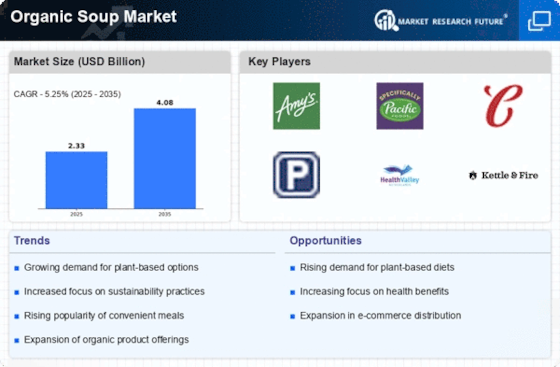Top Industry Leaders in the Organic Soup Market

Competitive Landscape of the Organic Soup Market: Key Players, Strategies, and Market Dynamics
The organic soup market has experienced substantial growth as consumers increasingly prioritize health and sustainability in their food choices. Key players in this sector are strategically positioning themselves to cater to the rising demand for organic and nutritious soup options. This analysis provides insights into the key players, strategies adopted, factors influencing market share, emerging companies, industry trends, overall competitive scenario, and a recent development in 2023.
Key Players:
Campbell Soup Company (U.S.)
The Kraft Heinz Company (U.S.)
Associated British Foods plc (U.K.)
Nestlé S.A. (Switzerland)
Unilever PLC (U.K.)
General Mills Inc. (U.S.)
Conagra Brands Inc. (U.S.)
B&G Foods Inc. (U.S.)
Strategies Adopted:
Market Share Analysis:
New & Emerging Companies:
Industry Trends:
Recent industry developments underscore a growing trend towards plant-based and functional soups within the organic segment. Major players are investing in incorporating functional ingredients like adaptogens, superfoods, and herbs known for their health benefits into organic soup formulations. Additionally, there is an increased focus on developing organic soups tailored to specific dietary preferences, such as gluten-free, vegan, and low-sodium options.
In terms of investment trends, companies are exploring sustainable packaging solutions to align with their organic and environmentally conscious positioning. Investments in eco-friendly packaging materials and initiatives to reduce plastic waste in soup packaging are prevalent across the industry.
Competitive Scenario:
The competitive landscape of the organic soup market is characterized by the dominance of established players with a wide range of organic offerings. Emerging companies, while gaining traction, face the challenge of competing with well-known brands. The focus on clean labels, sustainable practices, and innovative product offerings remains central to the overall competitive scenario.
Recent Development
The organic soup market was the increased focus on digital marketing and e-commerce strategies. Major players introduced initiatives to strengthen their online presence, leveraging e-commerce platforms to directly reach consumers. This development aligns with the changing consumer shopping behavior, with an increasing preference for online purchases and home delivery. Companies invested in creating user-friendly websites, implementing online marketing campaigns, and exploring partnerships with e-commerce platforms to enhance their digital visibility and accessibility. This shift towards digitalization reflects the industry's adaptation to evolving consumer trends and the importance of online channels in reaching a broader audience.











